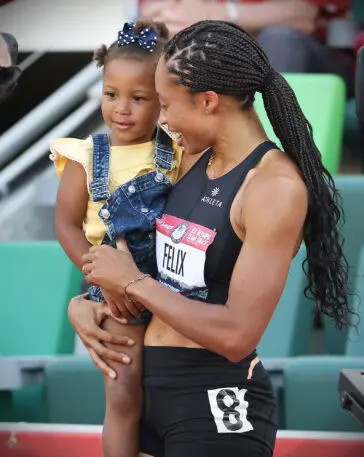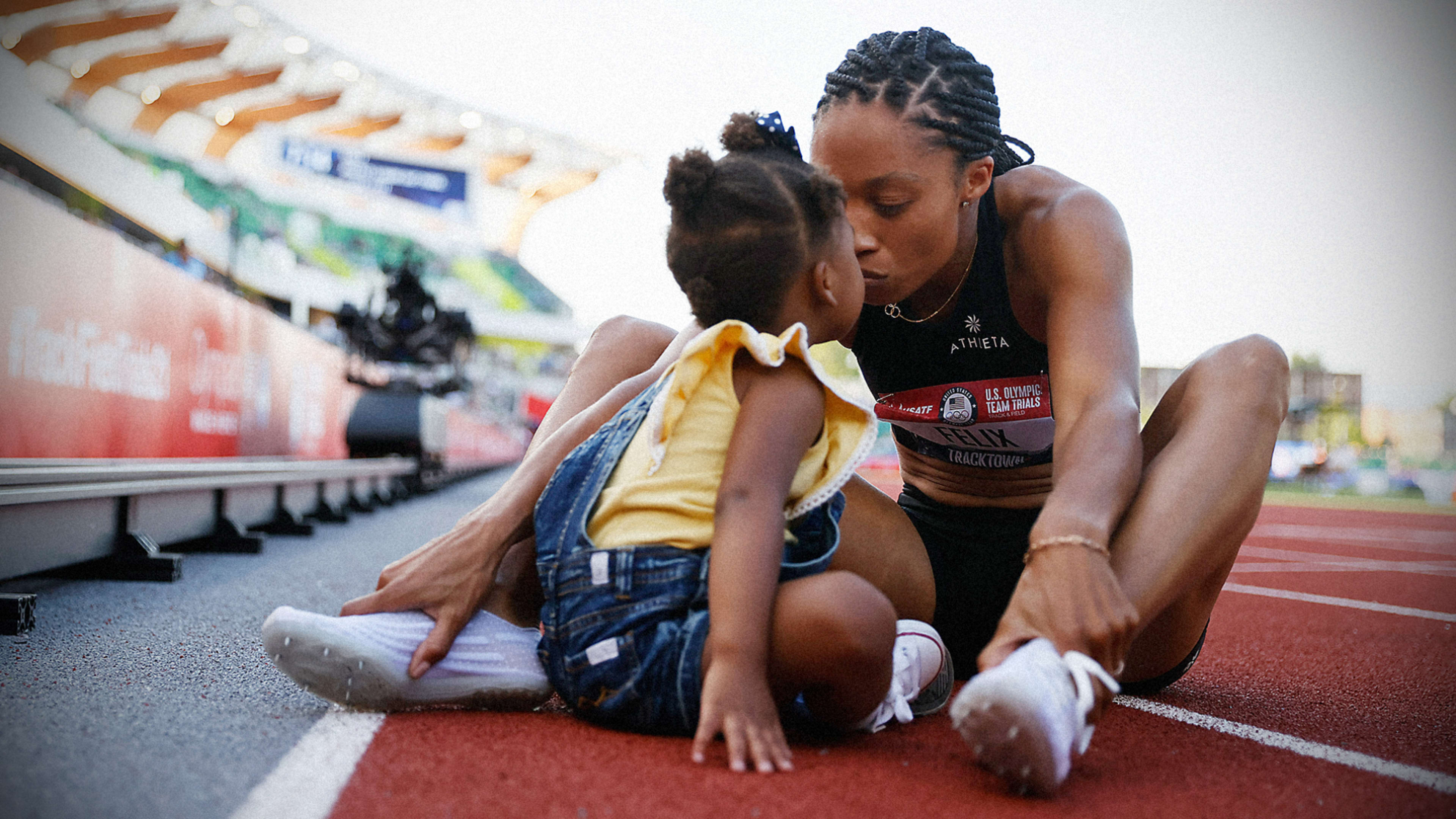When we marvel at female athletes beating world records at the Olympics, few of us stop to ask: Who’s watching their kids right now?
Allyson Felix, the most decorated track and field Olympian in history, knows exactly what it’s like to be worried about childcare while she’s training and competing. So this week, she announced a partnership with her primary sponsor, Athleta, and the Women’s Sports Foundation to launch a $200,000 grant aimed at covering childcare costs for professional athletes competing during 2021. Nine athletes have already been chosen, including Olympic hammer thrower Gwen Berry and Olympic saber fencer Mariel Zagunis, each of whom will receive $10,000.
Over the past two years, Felix has become one of the most vocal advocates for female athletes. After Olympian runners Alysia Montaño and Kara Goucher broke their nondisclosure agreements with Nike to share how poorly the company had treated them while they were pregnant, Felix stepped up to do the same. In 2019, she described in a New York Times op-ed how she tried to push back against Nike’s policy of cutting female athletes’ pay during and after pregnancy. When Felix asked Nike to guarantee that she wouldn’t be punished if she didn’t perform at her best in the months surrounding childbirth, the contract negotiations ground to a standstill.
“One of my first races back after giving birth to my daughter, Camryn, was the World Championships,” Felix tells Fast Company. “Not only was I still breastfeeding and physically and mentally exhausted from being a first-time mom while training and competing — I was assigned a roommate at the competition. There was no way I could bring my daughter into a shared room with another athlete who is trying to get in her zone.”
A few months later, Felix signed a sponsorship deal with Athleta, Gap Inc.’s activewear brand. “They get that I am a whole person beyond the track,” Felix says. “They jumped right in to support my training as well as my passions and advocacy platforms. In fact, part of my contract with Athleta includes provisions for Cammy to join me whenever I am competing. ”

Lora Webster, a 34-year-old Paralympic volleyball player, is among the recipients and plans to use the funds as she heads to Tokyo. Webster has three children, ages 6, 8, and 10, and says she has struggled to balance her responsibilities as a mother and an athlete. She’s traveled around the world to compete, from the Athens and Beijing Olympics to the Volleyball Masters in the Netherlands to the World Cup in Egypt. At the London Olympics in 2012, she didn’t tell her team that she was 20 weeks pregnant. “I didn’t want them to worry that they could do anything that might harm the baby,” she says.
But she says traveling to sporting events for weeks at a time with three kids at home is just as challenging as competing pregnant. Her kids miss her and she feels like she’s abandoning them. Then there’s the sheer cost, particularly since Webster doesn’t have a major corporate sponsor. She and her husband have had to pay thousands of dollars for babysitters while she’s traveling. This year, she has one less thing to worry about. “It’s not an exaggeration to say that this grant is life-changing,” Webster says. “It’s not just the money: It’s that big companies are now beginning to understand what the struggle really is for mom athletes.”
Webster says that she’s spent most of her life carefully separating her identity as a mother from her identity as an athlete. She rarely talks about her children when she’s training or interacting with her teammates because she’s concerned it might make her look weak. “As moms, there’s so much guilt leaving our babies at home to pursue our sport,” Webster says. “It’s something we can’t really talk about, because it makes us look like we’re not focused on the game.”
Felix wants to break that code of silence. As she heads to Tokyo as one of the top track and field athletes in the world—with six Olympic gold medals and 11 world championship titles—she’s using her clout not only to advocate for herself, but to start a conversation about what it’s like for professional athletes who choose to become mothers. “These grants are about showing the industry that all mom athletes need this same comprehensive support to be able to participate in their athletic endeavors,” Felix says.
And for Webster, this means a lot. “I’m floored that she has made this a priority,” Webster says. “It sends the message to all female athletes that we don’t have to choose between motherhood and our sport. We can do both.”
Recognize your brand’s excellence by applying to this year’s Brands That Matter Awards before the early-rate deadline, May 3.
